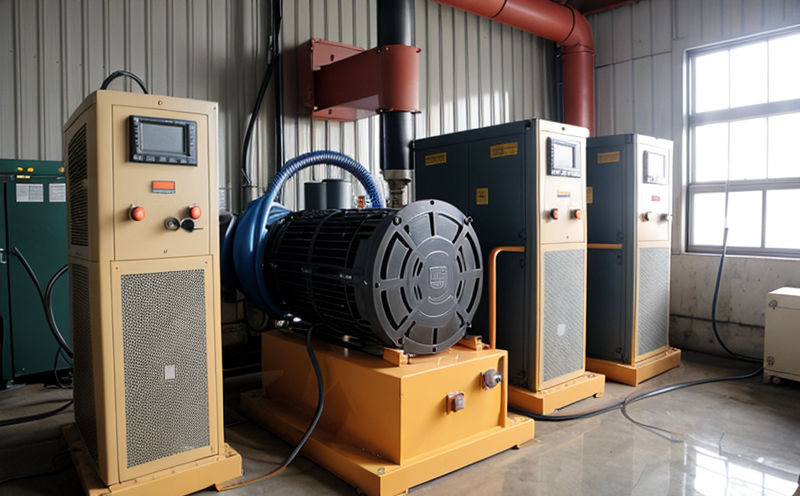ASTM D2892 Distillation Testing of Turbine Oils
The ASTM D2892 distillation test is a critical procedure used to evaluate the thermal stability and potential for carbon deposition in turbine oils. This test is particularly important for power generation equipment, where the reliability and efficiency of the machinery are paramount. The primary purpose of this test is to determine the temperature at which 10%, 50%, and 90% of the oil sample has distilled off (referred to as T10, T50, and T90 respectively). These values provide insights into the oil's volatility and thermal stability.
The ASTM D2892 test is performed in a distillation flask under controlled conditions. The specimen is heated at a specific rate until the specified temperatures are reached. The vapor pressure of the oil determines its boiling point, which is directly related to its potential for carbon formation during high-temperature operations. Carbon formation can lead to reduced performance and increased wear on critical components within power generation equipment.
The test procedure outlined in ASTM D2892 requires precise control over heating rates, cooling conditions, and the collection of distillates at various temperatures. The precision and accuracy of this test are crucial for ensuring that turbine oils meet the stringent requirements set by international standards such as ISO 11135-1 and ASME PTC 20.
Understanding the results from ASTM D2892 is essential for quality managers, compliance officers, R&D engineers, and procurement specialists. It helps in making informed decisions regarding the selection of lubricants that will ensure optimal performance, extend equipment life, and reduce maintenance costs. The test also aids in identifying potential issues early on, thereby preventing costly downtime.
The ASTM D2892 distillation test is widely recognized and accepted across various sectors including power generation, oil refineries, and industrial machinery. This standardization ensures that the testing process is consistent and reproducible, leading to reliable data and enhanced trust in the results.
International Acceptance and Recognition
The ASTM D2892 distillation test enjoys broad international acceptance due to its reliability and consistency. Many countries, including those adhering to European standards (EN ISO 11135-1), have adopted this procedure as a key component in their quality assurance programs for turbine oils. The United States, Canada, and numerous other nations rely on ASTM D2892 to ensure that the lubricants used in power generation equipment meet stringent specifications.
As an internationally recognized standard, ASTM D2892 provides a uniform method for evaluating the thermal stability of turbine oils. This uniformity is crucial for global supply chains and collaborative projects where multiple jurisdictions are involved. The test results can be easily compared across different countries, ensuring consistency in quality standards. This recognition also facilitates smoother international trade and collaboration.
The widespread adoption of ASTM D2892 underscores its importance in the power generation sector. By adhering to this standard, manufacturers and operators demonstrate their commitment to maintaining high-quality lubricants that can withstand the harsh operating conditions typical of turbines. This compliance is not only beneficial for individual facilities but also contributes to the overall reliability and efficiency of global power systems.
Environmental and Sustainability Contributions
The ASTM D2892 distillation test plays a crucial role in promoting environmental sustainability within the power generation sector. By ensuring that turbine oils have optimal thermal stability, the test helps reduce carbon deposits and other forms of contamination. This, in turn, leads to more efficient operation of turbines, which is essential for minimizing energy waste.
Efficient lubrication reduces friction losses, leading to lower fuel consumption and reduced emissions from power generation equipment. The use of ASTM D2892-compliant turbine oils can contribute significantly to reducing the carbon footprint of power plants. Additionally, the test helps in selecting lubricants that are less likely to break down under high temperatures, thus extending their service life and minimizing waste.
By promoting the use of sustainable lubricants, the ASTM D2892 test supports broader environmental goals. This includes reducing the need for frequent oil changes, which can be resource-intensive, and lowering the overall impact on the environment. The test also aligns with initiatives aimed at improving energy efficiency in power generation, thereby contributing to global efforts to combat climate change.
Use Cases and Application Examples
| Use Case Scenario | Description |
|---|---|
| Turbine Oil Selection | Ensure the lubricant meets thermal stability requirements. |
| Maintenance Planning | Determine the optimal oil change intervals based on volatility. |
| Performance Monitoring | Track changes in oil properties over time to identify potential issues early. |
| New Equipment Commissioning | Validate that the lubricant is suitable for the specified operating conditions. |
| Application Example | Description |
|---|---|
| Gas Turbine Lubrication | Evaluate oils used in gas turbines for power generation. |
| Cogeneration Plants | Determine the thermal stability of lubricants in combined heat and power systems. |
| Nuclear Power Generation | Assess oil compatibility with nuclear reactors to ensure safety and efficiency. |





